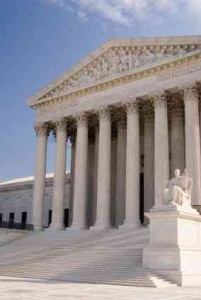The Supreme Court has issued a unanimous opinion which opens a new avenue for applicants who have lost an appeal with the Patent Office’s Board of Appeals and Interferences (BPAI). In Kappos v. Hyatt, 560 U.S. ___ (2012), after the application was rejected by the examiner and an appeal to the BPAI failed to reverse the examiner, applicant filed a lawsuit against the Director of the PTO at the district court rather than an appeal directly to the Federal Circuit (which is the usual approach).
In arguing for patentability of the claimed subject matter, the applicant introduced additional evidence in the form of an affidavit that had not been previously submitted to the Patent Office. The district court refused to consider this newly presented evidence stating that evidence could not be submitted at this stage unless it had been presented to the BPAI (sans a showing of good cause as to why it was not earlier presented). Additionally, the district court took a deferential approach as to the evidence before it and to the Patent Office. After the district court upheld the BPAI, the applicant appealed the case to the Federal Circuit, which vacated the district court’s grant of summary judgment. The Federal Circuit held that applicants are “free to introduce new evidence in § 145 proceedings subject only to the rules applicable to all civil actions, the Federal Rules of Evidence and the Federal Rules of Civil Procedure” even in the case where the applicant was not justified in failing to present the evidence to the PTO. The Patent Office appealed to the Supreme Court which, agreeing with the Federal Cirucuit’s reasoning, found for the applicant.
The takeaway for this case is that a section 145 action provides a powerful means for challenging an adverse decision by the BPAI. Under this ruling, courts must consider all of the evidence de novo (without deference to the Patent Office); it may come to a different conclusion based on the evidence than the BPAI. Moreover, certain forms of evidence not allowed in a BPAI proceeding, such as oral testimony, can be presented in a section 145 action in a district court . This can include oral testimony from an expert witnesses, for example, who may be able to provide persuasive evidence as to technical issuea and issues such as whether the written description and enablement requirements have been met.

